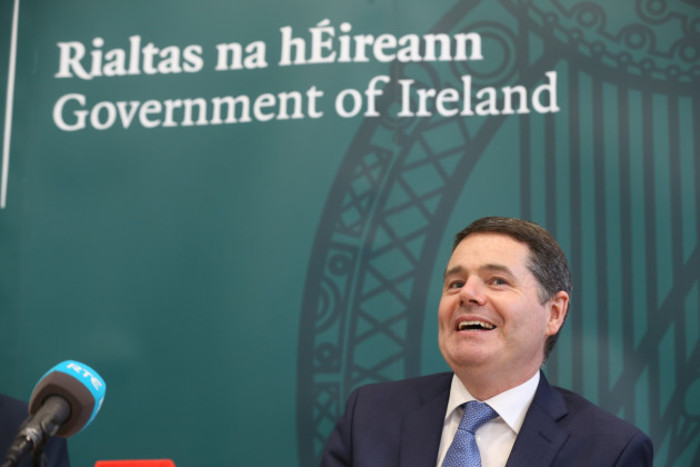The government wants to put €8bn into its rainy-day fund as it goes from 'famine to feast'
Ireland spent most of its previous sovereign wealth pool bailing out the banks.
THE GOVERNMENT PLANS to build a ‘medium-term’ buffer of €8 billion in its rainy-day fund to protect the economy from unforeseen shocks.
Finance Minister Paschal Donohoe today revealed the size of the planned emergency funding pool, which was flagged by his predecessor Michael Noonan in 2016 and confirmed in last year’s Budget.
He was given Cabinet clearance yesterday to start drawing up legislation to establish the fund in 2019.
Some €1.5 billion in existing funding from the Ireland Strategic Investment Fund will go into the pot, with another €500 million a year from government revenues to be diverted there over the next three years.
Donohoe this morning told Newstalk Breakfast the money would be used to “look after living standards … in the event of us being faced with an unknown shock in the future”.
When asked if the initial €3 billion to be accumulated in the fund over the first three years was “just a drop in the ocean”, the minister added that ”the medium-term plan is that we would get this fund up to approximately €8 billion”.
“We have many other needs that we have to meet each year, but as we stand at the moment tax revenues in the State are at an all-time high,” he said.
“We’ll have more people working in our country later on this year than we ever have before, so given all those developments it’s right to look at how we can plan better for our future.”
 Finance Minister Paschal Donohoe
Finance Minister Paschal Donohoe
Political pressure
The rainy-day fund was previously given a tentative endorsement by the country’s financial watchdog, the Irish Fiscal Advisory Council, as it could help the government “withstand political pressure” to spend when tax revenues were pouring in.
However last year, before the Budget announcement, Taoiseach Leo Varadkar appeared to cool on the idea – instead suggesting any available Exchequer funding should be spent on infrastructure.
The plans come as the State enjoys buoyant tax revenues and the government’s annual deficit approaches zero.
Nevertheless, the country is still burdened with net debt of around €190 billion and its previous sovereign wealth pool, the National Reserve Fund, was mostly plundered to bail out the banks after the financial crisis.
In a briefing note this morning, Goodbody chief economist Dermot O’Leary said the government had gone “from famine to feast over recent years” and it was encouraging that the two main political parties appeared to be keen to avoid past spending mistakes.
However he noted that the €500 million planned for the fund next year would trim the available ‘fiscal space’ for tax cuts and other spending measures to just €1.3 billion.
“It is welcome that prudent fiscal policies are being discussed, particularly the set up of a rainy-day fund,” he said.
“As the October budget approaches, it will be interesting to see whether political pressures to spend may threaten this prudent stance.”






